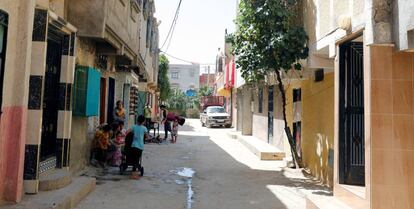Terror attacks in Barcelona put spotlight on Morocco
Eleven of the 12 men involved in last week’s killings were from the North African country

The grandparents of Younes Abouyaaqoub, the 22-year-old who drove the Renault van into crowds on Barcelona’s La Rambla last Thursday, explain that their grandson was not brought up in Morocco. What’s more, the Moroccan police insist that the 11 Moroccan-born members of the Barcelona cell are exceptions to the rule – isolated cases – in a country that prides itself on its tolerant brand of Islam. In Aghbalá, the hometown of the cell’s youngest member, 17-year-old Moussa Oukabir, who was shot by police in Cambrils, Tarragona, locals point out that he had little contact with Morocco, visiting once in four years.
But not everybody is convinced. For example, columnist Karim Boukhari addressed the issue this week in online publication Le360: “Our sickness is making us blind,” he wrote. “The argument is, ‘No, this has nothing to do with Islam. No, this has nothing to do with Morocco.’ The problem is that it does have to do with us and it does have to do with Islam – or militant Islam, which exists! It has to do with teaching and the interpretation of Islam and the way we bring up our children. It has to do with all of this and it has a lot to do with it!”
The argument is that this has nothing to do with Islam and Morocco Moroccan journalist Karim Boukhari
Boukhari continues: “ISIS has gathered its strength from the cynicism of the major powers and the geostrategic games played out in the Middle East. That is true. ISIS is a monster. It’s also been fueled by the disaffection of North African youths in Europe. The Islamic State has moved in to offer these young and desperate people a ticket to paradise. And who could refuse such an offer… But ISIS is first and foremost the product of our ailing societies – our sick education and our totally biased reading of the past (we were the greatest) and the present (if we are not still the greatest, the blame lies with others. Kill them, eradicate them and we will be the greatest again). Sick, because we are incapable of looking in the mirror and taking responsibility for the situation.”
No one knows better than the Moroccan police how many jihadists have come from Morocco. While one member of the Barcelona cell was born in the Spanish enclave of Melilla, the 11 remaining members were originally from Morocco. Just hours after the Barcelona attack, an 18-year-old Moroccan stabbed two women to death in Turku, Finland. Going back to 2015, 29-year-old Belgian-Moroccan Abdelhamid Abaaoud was the brains behind the November attacks in Paris – he was subsequently hunted down in the north of Paris and killed thanks to Moroccan intelligence, prompting the then French President François Hollande to invite the Moroccan King Mohamed VI to the Élysée Palace as a token of the country’s gratitude.
ISIS has a mother, the invasion of Iraq. But it also has a father: Saudi Arabia and its industry of extremist ideology Algerian writer Kamel Daoud
Finally, there are the 1,500 Islamists who have left Morocco to fight for the Islamic State in Syria, a number that doesn’t include the Moroccan-born jihadists who departed from France, Belgium and Spain.
The Moroccan police are all too aware of the situation and barely a month goes by without them breaking up cell preparing an attack in the name of ISIS. Morocco is very efficient at fighting Islamist terrorism and does so on several fronts: the security services monitor the training of imams and the radicals responsible for the Casablanca attacks in 2003 who were pardoned, as well as cooperating closely with the Spanish and French police. But unless the country is willing to take a realistic look at what is happening, these measures are futile.
Few commentators in Morocco and the wider region are prepared to speak out like Boukhari, though the Algerian writer Kamel Daoud comes to mind. He calls on the West to question its relationship with Saudi Arabia – “the main sponsors of Islamist culture.”
In a recent article, Daoud wrote: “ISIS has a mother – the invasion of Iraq. But it also had a father – Saudi Arabia and its industry of extremist ideology. If the West’s meddling has given the desperate inhabitants of the Arabic world a motive, the Saudi Kingdom has armed them with their beliefs and convictions. If we don’t get our heads around this, the war will be lost even when the battles are won. We will kill jihadists but subsequent generations will reproduce them, stoked by the same literature”.
The fight against Islamist terror promises to be a long and complicated one. The key will be countries looking at themselves long and hard in the mirror, but this, of course, is easier said than done.
English version by Nick Lyne.
Tu suscripción se está usando en otro dispositivo
¿Quieres añadir otro usuario a tu suscripción?
Si continúas leyendo en este dispositivo, no se podrá leer en el otro.
FlechaTu suscripción se está usando en otro dispositivo y solo puedes acceder a EL PAÍS desde un dispositivo a la vez.
Si quieres compartir tu cuenta, cambia tu suscripción a la modalidad Premium, así podrás añadir otro usuario. Cada uno accederá con su propia cuenta de email, lo que os permitirá personalizar vuestra experiencia en EL PAÍS.
¿Tienes una suscripción de empresa? Accede aquí para contratar más cuentas.
En el caso de no saber quién está usando tu cuenta, te recomendamos cambiar tu contraseña aquí.
Si decides continuar compartiendo tu cuenta, este mensaje se mostrará en tu dispositivo y en el de la otra persona que está usando tu cuenta de forma indefinida, afectando a tu experiencia de lectura. Puedes consultar aquí los términos y condiciones de la suscripción digital.









































